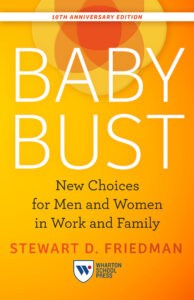Baby Bust
New Choices for Men and Women in Work and Family
Download a free chapter
In the current debates on work and family, people of all generations are calling for a reasoned, thoughtful, research-driven contribution to the discussion. In Baby Bust, Stew Friedman offers just that: an astute assessment of how far we have come and where we need to go from here. The book is based on a groundbreaking cross-generational study reveals both greater freedom and new constraints for men and women in their work and family lives.
Stew Friedman, founding director of The Wharton School’s Work/Life Integration Project, studied two generations of Wharton college students as they graduated: Gen Xers in 1992 and Millennials in 2012. The cross-generational, longitudinal study produced a stark discovery – the rate of graduates who plan to have children has dropped by nearly half over the past 20 years. At the same time, men and women are now more aligned in their attitudes about dual-career relationships, and they are opting out of parenthood in equal proportions. But their reasons for doing so are quite different.
In Baby Bust: New Choices for Men and Women in Work and Family, Friedman draws on this historical research to explain why so many young people are not planning to become parents. He reveals good news, that there is a greater freedom of choice now, and bad, that new constraints are limiting people’s options. In light of these present realities, he offers practical ideas for what we can do as a society, in our organizations, and for ourselves to make it easier for men and women to choose the lives they want.
In this highly readable narrative that brings important research to life, Friedman addresses:
- How views about work and family have changed in the past 20 years.
- Why men and women have different reasons for opting out of parenthood.
- How family has been redefined.
- Why we are all now part of a revolution in work and family.
- What choices we face in our social and educational policy.
- How organizations and individuals — especially men — can spur cultural change.
Reviews and Media
2015. Why more millennials are choosing to be childless. The Christian Science Monitor, April
2014. Why Child Care Is the Economy’s ‘Invisible’ Driver. Knowledge@Wharton, September.
2014. Why Millennials Should Have Kids — and Soon. Time, September.
2014. Is Work-Life Conflict Reaching a Tipping Point? Harvard Business, March.
2014. On Wall Street, a Generation Gap on Work/Life Issues. New York Times, January.
2014. Banks Ease Work Conditions. Markets Now Video, January.
2014. Millennials Want Children, But They’re Not Planning on Them. New York Times, January.
2013. Ideas that Shaped Management in 2013. Harvard Business, December.
2013. The Parent Trap. Think on Public Media, December.
2013. Bye bye, Baby. Washington Post, November 29.
2013. The New Sexy: Millennial Egalitarian Men. Huffington Post, November 7.
2013. Why leaders are saying: Career first, kids — maybe never. Globe and Mail, November 7.
2013. Bye Bye, Babies. Psychology Today, November 5.
2013. 20 Years and No Closer to Sustainable Work/Life. Wharton Magazine, October 30.
2013. Baby Bust, Millennials Opting-Out of Parenthood. NYC Dad’s Group Podcast, October 29
2013. Why Wharton Undergrads Are Saying ‘No’ To Having Kids. Forbes, October 19.
2013. More Millennials are putting pregnancy on pause. Chicago Public Radio, October.
2013. Wharton Prof. Sees Continuing Decline In Young People’s Interest in Parenthood. CBS Philly, October 16.
2013. Baby Bust: Millennials’ View Of Family, Work, Friendship And Doing Well. Forbes, October 5.
2013. Has the Movement for Women’s Equality Hit a Wall? PRI’s To the Point, February 22.
2013. Today’s Grads Choose Work Over Family. CBS Local, February 20.
2013. The changing nature of ‘having it all’. Knowledge@Wharton, January 25, 2013.





